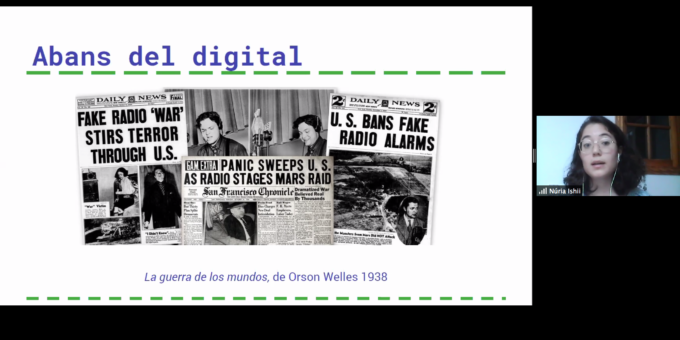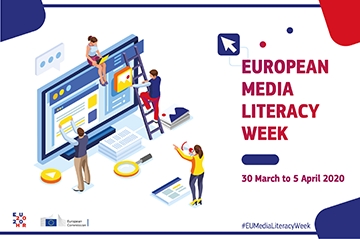
It is weird how things happen and how quickly changes happen in this new VUCA (volatility, uncertainty, complexity and ambiguity) era.
At the beginning of March, we were about to close the agreements to do the Get Facts courses (“las cosas claras”, as we refer to them here) in schools when COVID-19 arrived and confined us to our homes. The schools were also closed. The project team reacted relatively quickly: we had excellent training materials and wanted to share it immediately with a good group of trainers with whom we interact very often: the e-facilitators of the Omnia Network, a network of digital training centres specializing in working in depressed areas, with a population at risk of social exclusion.
So, we set out to provide training to these trainers, in a format that was new to us: 1 webinar as a starting point (it was very long; too long as we figured it out) and a virtual environment of learning as support. 46 of these trainers showed their interest, participated in the webinar (we had many difficulties in relation to connectivity, as some of them are located in areas of Catalonia with poor web access). They also browsed the virtual classroom and were able to explore and enrich the training materials.
 Lesson learned: we could not effectively organise such long webinars, so we modified our design and offered, in collaboration with the network of Barcelona Libraries, a new edition for 40 people; this time structured in 7 webinars and some reflection or test-type exercises on our Campus Colectic platform. This experience was very interesting: the new webinar format allowed more interaction with the participants although some of them were very reluctant to participate in the part that was recorded and participated more actively in the live part of the webinar (the last half hour of the session). By then, everyone was already used to confinement, but parents had to take care of the children and grandparents and schedules were complicated (we organised webinars during the afternoon, to encourage maximum participation). The young men and women -teenagers – were missing. There were people enrolled who were unable to connect: again, the digital divide. Thanks to some phone calls, we were able to rescue a part of the group, but not everyone. Another lesson learnt: we need to keep working on digital competences if we want to encourage and ensure online learning, which today is not something available to all people.
Lesson learned: we could not effectively organise such long webinars, so we modified our design and offered, in collaboration with the network of Barcelona Libraries, a new edition for 40 people; this time structured in 7 webinars and some reflection or test-type exercises on our Campus Colectic platform. This experience was very interesting: the new webinar format allowed more interaction with the participants although some of them were very reluctant to participate in the part that was recorded and participated more actively in the live part of the webinar (the last half hour of the session). By then, everyone was already used to confinement, but parents had to take care of the children and grandparents and schedules were complicated (we organised webinars during the afternoon, to encourage maximum participation). The young men and women -teenagers – were missing. There were people enrolled who were unable to connect: again, the digital divide. Thanks to some phone calls, we were able to rescue a part of the group, but not everyone. Another lesson learnt: we need to keep working on digital competences if we want to encourage and ensure online learning, which today is not something available to all people.
We wanted to make another round of the course, testing the implementation of a more compressed format than the second edition and less than the first: structuring the topic through 5 webinars. We also took more care of the virtual environment and simplified it a bit (we were too ambitious also with the second edition). In this case, we could not attract so many participants (already in the middle of July and after so many weeks of COVID- 19 lockdowns, energies and willingness to participate were much lower) Of course, as there were fewer people, the interactions were very rich. Every situation has its advantages!
 All in all, It has been a very enriching process. Some participants commented that the course could have been more fun, or that it could be improved by adding more challenges like the ones we did in the final part (a small competition between teams to discover misinformation – which, in addition, were created by the participants) and also that it would have been interesting to incorporate a guide to the operation of the virtual space. We also had very positive comments and some came to our hearts and will mark our work plan in the next year: “The course was very good, we should all follow it: at schools and at work” and also this one was very relevant to us: “It is the first time that I meet you, and it would be good to take it -the training- to institution and training centres for adults and the elderly.”
All in all, It has been a very enriching process. Some participants commented that the course could have been more fun, or that it could be improved by adding more challenges like the ones we did in the final part (a small competition between teams to discover misinformation – which, in addition, were created by the participants) and also that it would have been interesting to incorporate a guide to the operation of the virtual space. We also had very positive comments and some came to our hearts and will mark our work plan in the next year: “The course was very good, we should all follow it: at schools and at work” and also this one was very relevant to us: “It is the first time that I meet you, and it would be good to take it -the training- to institution and training centres for adults and the elderly.”
So … we are already planning the new school year!
Text and images: Colectic



















